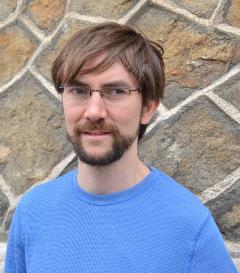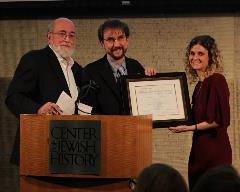Interview with Dr. Ethan Katz
University of Cincinnati professor Ethan Katz joined the rankings of well-known writers, such as Eli Wiesel and Philip Roth. Recently, the Jewish Book Council awarded Katz the National Jewish Book Award for 2015 in the category of “Writing Based on Archival Material" for his book, “The Burdens of Brotherhood: Jews and Muslims from North Africa to France,” which was published in November. Katz, along with his wife, Hagit Caspi, and his father, Allan J. Katz, a former U.S. Ambassador to Portugal, attended the March 9, awards ceremony in New York City. 
“The Burdens of Brotherhood,” which grew out of Katz’s doctoral dissertation, is about the interactions between French Jews and French Muslims during the stormy history of France during the Twentieth Century. Much attention is focused on those who lived in France’s American Jewish lore. Award winners this year include Dennis Ross, longtime Middle East envoy, who served two years as special assistant to President Obama, and Rabbi Lord Jonathan Sacks, former Chief Rabbi of England, who is a global religious leader, philosopher, and bestselling author. Other past award winners include Elie Wiesel, the Nobel Peace Prize winner and well-known author of “Night” (where Wiesel describes his and his father’s experiences in Nazi Germany’s concentration camps) and such renowned luminaries of Jewish letters as Philip Roth, winner twice of the U.S. National Book Award for Fiction and winner of the Pulitzer Prize, and Isaac Bashevis Singer, winner of the Nobel Prize for Literature.
Katz gives a prime example of the complexity of this history in the third chapter of his book, entitled “Jews as Muslims and Muslims as Jews.” The chapter is set during World War II, when Germany invaded and occupied France and the lives of many Jews were in danger (eventually one fourth of France’s Jews were deported and murdered). France’s government, during that time became known as Vichy France – a government that ruled in the Southern Zone while Germany occupied the Northern Zone.
.tmb-medium.jpeg?sfvrsn=8bf1d20f_1) On the rue de Surènes, a Parisian street, there stood a café named “Little Hungary.” An Iranian Muslim, Sebastien Hassid, owned the restaurant along with his wife, Ilonka Laufer, and Laufer’s sister, Blanche Luckas. The problem: German authorities questioned the religious identity of Laufer, who had changed her name to Ilonka Hassid. Born Jewish, she had become a practicing Muslim due to her marriage.
On the rue de Surènes, a Parisian street, there stood a café named “Little Hungary.” An Iranian Muslim, Sebastien Hassid, owned the restaurant along with his wife, Ilonka Laufer, and Laufer’s sister, Blanche Luckas. The problem: German authorities questioned the religious identity of Laufer, who had changed her name to Ilonka Hassid. Born Jewish, she had become a practicing Muslim due to her marriage.
Under a new German ordinance, in Northern France, all Jewish property was given to “provisional administrators.” Suspicious of Ilonka Hassid’s and Blanche Luckas’ religious origins, “provisional administrators” took over the restaurant ownership. Luckas had to sell her stock in the restaurant. Ultimately, as Katz writes, “Despite failing to obtain further information, the (German) authorities concluded in February 1943 that Ilonka Hassid was indeed a Muslim and that the Hassids’ marriage contract made her husband’s property separate from her own. They they said the restaurant should be returned to the Hassids.”
This case illustrates how French policy influenced the relationships between Muslims and Jews in France and its territories. Throughout the book, Katz gives other examples of how the French state played a key role in Muslim-Jewish relations. He shows how varied relations were historically, while also tracing the way that by the later decades of the twentieth century, Muslims and Jews were more sharply demarcated from one another and frequently aligned with opposing political camps in the Israeli-Arab struggle. During the start of the Century, Jews were content with living under the French government amongst their Muslim neighbors, but by the middle and toward the end of the century, many Jews were leaving France and its colonies to go to Israel.
A Chateaubriand Fellowship from the Cultural Services of the French Embassy in the United States helped Katz start the research for his dissertation. This highly selective fellowship allows doctoral students enrolled in American universities to research in France for four to nine months. It enabled Katz to spend nearly a year traveling between three French cities, gathering material in some twenty archives that he would use for his book.
Being bilingual, Katz was able to read through thousands of French documents for the book..tmb-medium.png?sfvrsn=62faa925_1) He had majored in history and French at Amherst College, from which he graduated Summa Cum Laude in 2002. While at Amherst he spent a semester in France. Since then, Katz has returned to France many times for his studies. And, he is improving upon a third language – Hebrew. Katz has also made trips to Israel for studies and research.
He had majored in history and French at Amherst College, from which he graduated Summa Cum Laude in 2002. While at Amherst he spent a semester in France. Since then, Katz has returned to France many times for his studies. And, he is improving upon a third language – Hebrew. Katz has also made trips to Israel for studies and research.
Besides the Chateaubriand Fellowship, Katz also received the George L. Mosse distinguished graduate fellowship from the University of Wisconsin, dissertation grants from the Foundation for Jewish Culture, the Memorial Foundation for Jewish Culture, and the Society for French Historical Studies. Katz has also received funding from the Katz Center for Advanced Judaic Studies at the University of Pennsylvania and the Charles Phelps Taft Research Center, each of which provided a year-long research and writing fellowship that proved crucial to the completion of his book.
Katz is already working on a new book – where he hopes to describe in detail a little-known Algerian uprising from 1940 to 1943. This insurrection proved pivotal to the success of Operation Torch, the Allied landing in North Africa in November 1942, which Katz explains was at that time the largest amphibious invasion in recorded human history. This operation consisted of simultaneous landings at three points, Casablanca (in Morocco), Oran (in Algeria), and Algiers (also in Algeria).
For more information about Dr. Katz, go to his Web site athttp://www.ethankatz.net/about.html. For more information about the Jewish Book Council Awards, visit the council’s Web site at http://www.jewishbookcouncil.org/awards/2015-national-jewish-book-award-winners-and-finalists.
Update:

Here is a picture of Dr. Katz receiving the 2015 National Jewish Book Award during the March 9, awards dinner at the Center for Jewish History in New York City. To his left is Naomi Firestone-Teeter, Executive Director of the Jewish Book Council. To his right is Rabbi and best-selling author Joseph Telushkin, who acted as the emcee at the awards dinner.